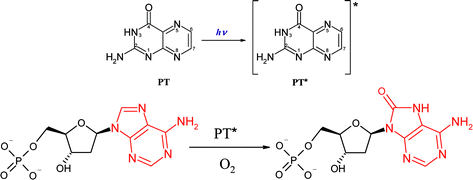Photosensitization of 2′-deoxyadenosine-5′-monophosphate by pterin†
Abstract
UV-A radiation (320–400 nm) induces damages to the DNA molecule and its components through photosensitized reactions. Pterins, heterocyclic compounds widespread in biological systems, participate in relevant biological processes and are able to act as photosensitizers. We have investigated the photosensitization of 2′-deoxyadenosine-5′-monophosphate (dAMP) by pterin (PT) in aqueous solution under UV-A radiation. The effect of pH was evaluated, the participation of oxygen was investigated and the products analyzed. Kinetic studies revealed that the reactivity of dAMP towards singlet oxygen (1O2) is very low and that this reactive oxygen species does not participate in the mechanism of photosensitization, although it is produced by PT upon UV-A excitation. In contrast, analysis of irradiated solutions by means of electrospray ionization mass spectrometry strongly suggested that 8-oxo-7,8-dihydro-2′-deoxyadenosine-5′-monophosphate (8-oxo-dAMP) was produced, indicating that the photosensitized oxidation takes place via a type I mechanism (electron transfer).


 Please wait while we load your content...
Please wait while we load your content...